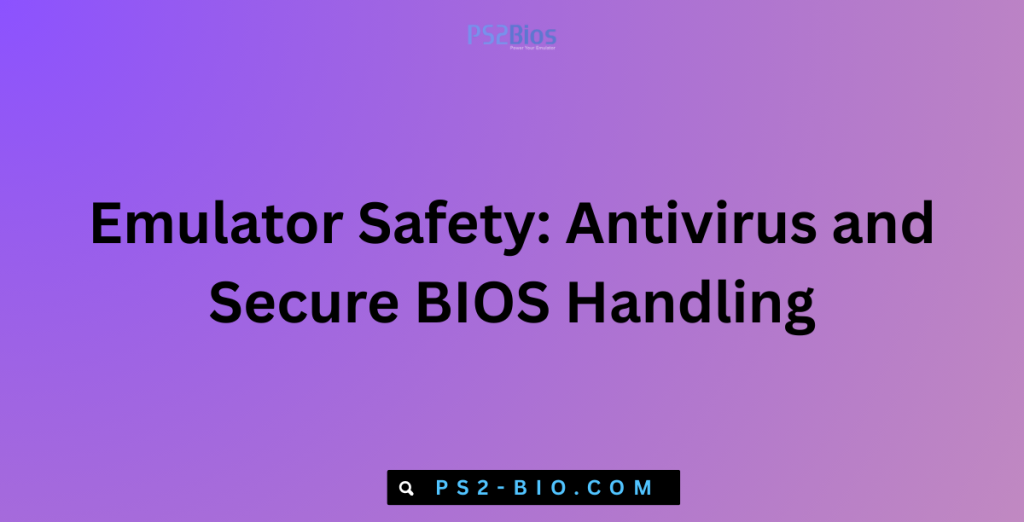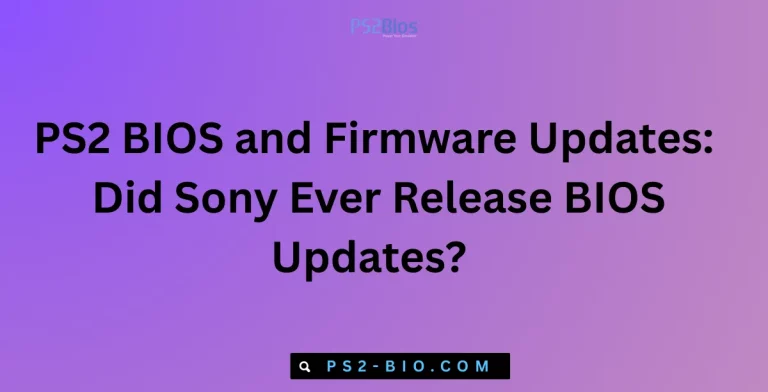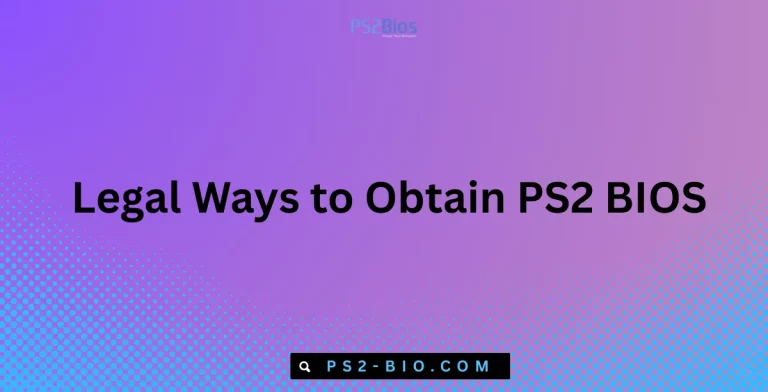Emulator Safety: Antivirus and Secure BIOS Handling
Are emulators safe to use, or can they harm your computer? Many users worry about antivirus alerts, BIOS security, and legal risks when setting up emulation.

What Is an Emulator?
An emulator is a software program that mimics the hardware of a gaming console or computer system. It allows users to run applications or games that were originally designed for other platforms.
For example:
- PCSX2 emulates the PlayStation 2.
- Dolphin Emulator supports GameCube and Wii.
- Citra emulates Nintendo 3DS.
Emulators themselves are legal. They act like a translator, converting console instructions into a language your computer can understand. Problems arise not from the emulator itself but from how BIOS files and game ROMs are obtained.
Are Emulators Safe From Viruses?
Most emulator programs from official websites are safe. Developers release them as open-source projects, with source code available for public review. However, risks come when users:
- Download from unofficial sources – Fake sites may bundle malware.
- Use cracked versions – Modified builds can carry hidden spyware.
- Disable antivirus – Some users mistakenly turn off protection, increasing exposure to threats.
A 2024 report by AV-TEST showed over 350,000 new malware samples released daily. This makes downloading emulators from unverified sites extremely risky. Always verify the official website before installation.
Why Antivirus Flags Emulators
Some antivirus programs may detect emulator files as suspicious. This is known as a false positive. Reasons include:
- Uncommon file signatures – Smaller open-source apps may not be recognized by antivirus databases.
- Packed executables – Compression tools used by developers can resemble malware packaging.
- Driver-level access – Certain emulators interact with hardware in ways that trigger alerts.
For instance, DS4Windows requires ViGEmBus drivers to emulate Xbox controllers. While safe, these drivers may raise security alerts because they operate at system level.
If flagged, cross-check by:
- Scanning with multiple antivirus engines using VirusTotal.
- Checking the SHA256 hash from the official release page.
- Reviewing the project’s GitHub repository for authenticity.
Safe Download Practices for Emulators
To minimize risks, follow these steps:
- Download from the official site – Example: pcsx2.net for PCSX2.
- Check HTTPS – Ensure the URL starts with
https://for secure communication. - Verify digital signatures – Many developers sign releases to prove authenticity.
- Avoid torrents – Most torrent-hosted emulators contain tampered files.
Tip: Bookmark the official websites of your preferred emulators and only update from those sources.
What Is a BIOS File and Why Is It Sensitive?
A BIOS (Basic Input/Output System) file is critical for console emulation. It is firmware extracted from the original hardware.
Examples:
- PlayStation 2 BIOS for PCSX2
- PlayStation 1 BIOS for ePSXe
- Sega Dreamcast BIOS for Redream
Without BIOS, many emulators cannot function. Unlike emulators, BIOS files are copyrighted by console manufacturers such as Sony or Nintendo. This makes them sensitive from both a legal and security standpoint.
Secure BIOS Handling
Because BIOS files are copyrighted, downloading them from random websites is illegal and unsafe. Many of these downloads hide malware. Safe handling requires:
- Dumping BIOS from your own console – Tools like BIOS Dumper for PlayStation allow legal extraction.
- Avoiding pre-bundled BIOS packages – If an emulator site offers “ready-to-play” builds with BIOS included, it’s likely distributing illegal files.
- Storing BIOS securely – Keep the file on encrypted storage or a dedicated folder with restricted permissions.
- Verifying integrity – Use checksum tools to confirm the BIOS matches your own extraction.
Risks of Downloading BIOS from Unverified Sources
Downloading BIOS from untrusted sites exposes users to:
- Trojan malware hidden inside compressed BIOS archives.
- Phishing attempts where fake sites imitate official emulator pages.
- Legal consequences, since distributing BIOS violates copyright law.
In 2021, Nintendo filed multiple lawsuits against ROM and BIOS distributors, emphasizing the legal consequences of unauthorized sharing.
Antivirus Best Practices for Emulator Safety
Using antivirus alongside emulators ensures a secure environment. Follow these best practices:
- Keep antivirus updated – Outdated definitions cannot detect new threats.
- Whitelist official emulator executables – Prevent false positives while keeping protection active.
- Run periodic full scans – Especially after installing new emulator components.
- Use real-time monitoring – Block suspicious behavior instantly.
- Check emulator forums – Communities often report if a release contains issues.
Using Virtual Machines for Extra Protection
Advanced users can run emulators in a virtual machine (VM). This isolates the emulator from the host system, adding an extra security layer.
Benefits include:
- Prevents malware from spreading to your main OS.
- Enables testing of suspicious files safely.
- Allows restoring clean snapshots if needed.
Popular VM software includes VMware Workstation Player and Oracle VirtualBox.
Legal and Ethical Considerations
Understanding the difference between legal emulators and illegal BIOS distribution is critical:
- Legal: Downloading emulators from official sites.
- Illegal: Downloading BIOS or game ROMs you don’t own.
For lawful use:
- Dump your own BIOS using authorized tools.
- Create your own game backups using hardware like a disc drive dumper.
This ensures both security and compliance with copyright laws.
Secure Storage and Backup of BIOS Files
Once you have legally extracted your BIOS, secure handling is important:
- Encrypt storage devices to prevent unauthorized access.
- Create backups on offline drives.
- Avoid cloud storage unless encrypted, since leaks could expose copyrighted files.
Example: Use tools like VeraCrypt to create encrypted containers for storing BIOS files securely.
Frequently Asked Questions (FAQ)
1. Can emulators damage my computer?
No, emulators themselves are safe if downloaded from official sources. Risks occur when installing from fake sites or using pirated BIOS and ROMs.
2. Why does my antivirus block PCSX2 or Dolphin?
It’s usually a false positive due to uncommon code signatures. Verify using VirusTotal and whitelist if the file is from the official site.
3. How can I legally get a PlayStation BIOS?
You must extract it from your own console using a BIOS dumper. Downloading it online is illegal and unsafe.
4. Is it safe to run emulators without antivirus?
No. Running without antivirus increases exposure to hidden malware. Always use updated security software.
5. Are pre-installed emulator packs safe?
No. Pre-bundled emulators often include illegal BIOS and may carry malware. Always install emulators directly from their official websites.
Conclusion
Emulator safety depends on source, antivirus, and BIOS handling. Emulators themselves are legal and safe when downloaded from official websites. Risks arise when users disable antivirus or download BIOS and ROMs from unverified sources. To ensure protection:
- Use official emulator websites.
- Keep antivirus active and updated.
- Extract your own BIOS legally.
- Store BIOS files securely with encryption.
By following these steps, users can enjoy emulation safely without risking malware infections or copyright violations.






